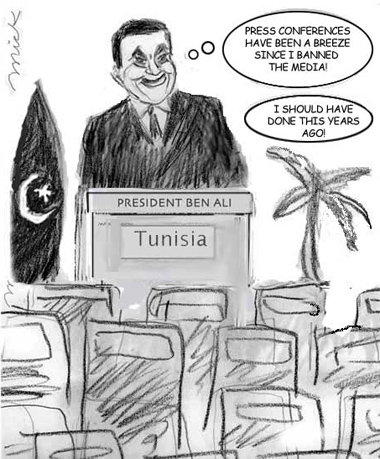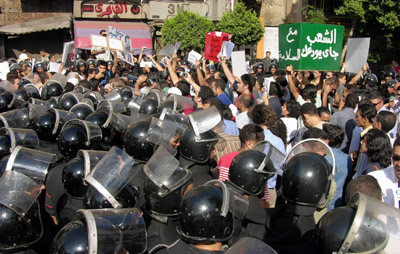
In Egypt, a deplorable press freedom climate
Judging by what’s transpired in recent weeks, press freedom in Egypt is in a deplorable state. To hear that Egyptian police abused and illegally detained peaceful protestors who took to the streets on April 6 is par for the course. To read that police and plainclothes thugs also beat and detained journalists, confiscating and destroying…

A perfect press conference in Tunisia
The government of President Zine El Abidine Ben Ali has made it clear there is little room for a critical press in Tunisia. Taking a cue from the government’s recent anti-press actions, CPJ cartoonist Mick Stern imagines the president’s “ideal” press conference. See more Mick Stern cartoons.
Tunisia blocks journalists from press conferences
New York, March 25, 2010—Tunisian authorities banned journalists from attending two press conferences for the launch of local and international human rights reports this week, and is stepping up harassment of journalists overall, the Committee to Protect Journalists said today.
Tunisian airport officials confiscate CPJ publications
On Saturday, Tunis airport customs officials confiscated two copies of CPJ’s annual report, Attacks on the Press, as well as five copies of the Arabic-language translation of the Middle East and North Africa section of the book from Tunisian rights lawyer Mohamed Abbou and journalist Lotfi Hidouri on their return from Morocco, the two men told CPJ.
In prison, Tunisian journalist’s health is worsening
New York, February 25, 2010—The Committee to Protect Journalists calls on the Tunisian authorities to immediately release journalist Taoufik Ben Brik, who is serving a six-month jail sentence, so that he can receive the medical treatment he needs.

Human rights coverage spreads, despite government pushback
By Mohamed Abdel Dayem and Robert Mahoney The media in the Middle East loved the Intifada. Every detail of Israel’s violations of human rights in the late 1980s in the West Bank and Gaza appeared in the Arabic and Farsi press. The governments that owned or controlled these media outlets loved it, too. When pan-Arab…
Attacks on the Press 2009: Tunisia
Top Developments• Government engineers ouster of independent journalist union leaders.• Two journalists are jailed in retaliation for critical reporting. Key Statistic 97: Percentage of newspaper campaign coverage that was devoted to President Ben Ali. President Zine el Abidine Ben Ali was re-elected to a fifth term with 90 percent of the vote amid severe restrictions on…

In Tunisia, critical journalist’s appeal rejected
New York, February 1, 2010—A Tunisian appeals court on Saturday upheld a six-month prison sentence against journalist Taoufik Ben Brik, one of President Zine El-Abidine Ben Ali’s toughest critics, according to news reports. The Committee to Protect Journalists denounced the decision, the latest development in the politically motivated effort to silence Ben Brik.